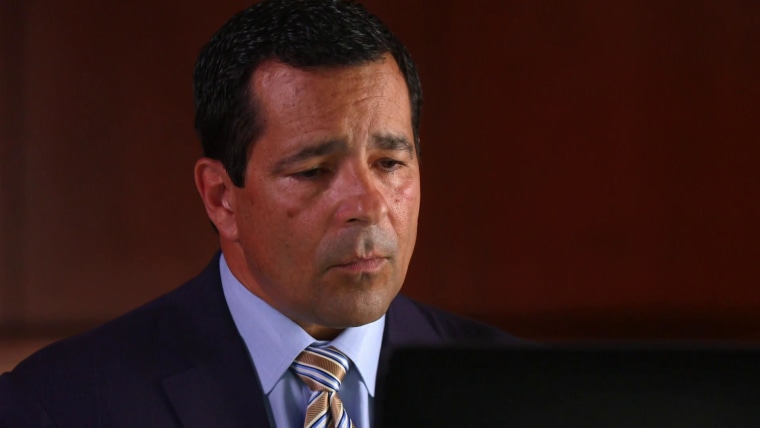WASHINGTON — When social media companies announced in September that the Russians were once again using a fake news site to try to influence American public opinion, it made big headlines.
After a tip from the FBI, Facebook and Twitter took down accounts related to Peacedata, which Facebook said was a Russian front paying unwitting freelancers to post far-left content.
But even as Peacedata was operating in secret, other Russian-backed media platforms have openly been churning out propaganda online using a similar model with far more impact, U.S. officials and private experts say.
A group of web sites that U.S. officials say are Russian-backed, including Soapbox, “In the Now,” Redfish and Ruptly, have been putting out sophisticated English-language video and text content for years that experts say is edited and curated in a way designed to exacerbate American political tensions. A lot of it is aimed at younger viewers and the political left, designed to peel them off from the Democratic party, experts say. Some is tailored to gin up outrage on the right.
The videos are not fake — they are accurate footage selectively presented, experts say.
“It is a way for the younger audience to encounter what is state-sponsored, Russian-paid propaganda without really knowing that’s what they’re encountering.” said Clint Watts, a former FBI agent who studies foreign disinformation.
Peacedata, he said, “was essentially a covert effort to get Americans to deliver messages on behalf of the Kremlin into the U.S. audience base. And Americans were duped in that case. But with Ruptly/Redfish, they’re overt about who pays their bills. It just doesn’t necessarily [become obvious] to the U.S. audience.”
Russian-backed English-language sites have a significant reach on social media, racking up millions of views and engagements, according to research by the Alliance for Securing Democracy. Perhaps the most far-reaching of these efforts is Ruptly, which boasts 114,000 Twitter followers and 1.48 million YouTube subscribers. Its most popular videos can exceed 3 million views, and that doesn’t take into account how often Ruptly videos are seen when sold to media outlets.
Ruptly is owned by the parent company of RT, Russia’s English-language propaganda platform. The 2016 U.S. intelligence assessment of Russian election interference said RT runs a “Kremlin-directed campaign to undermine faith in the US Government and fuel political protest.”
Ruptly brands itself an independent news agency that sells video to other news organizations all over the world. It also posts videos to its site, and also to Facebook, YouTube, Twitter and other social media. NBC News has licensed video from Ruptly.
In a statement to NBC News, Ruptly said it “has always been completely transparent about its Russian shareholders and relationship to RT. However, Ruptly is based in Berlin and is a commercially funded organization under German law. As such we are legally obliged to be editorially independent at all times and we take these legal responsibilities extremely seriously. Even without these requirements, editorial impartiality has always been the foundation of our vision and news gathering approach.”
A company called Maffick LLC, which owns In the Now and Soapbox, is suing Facebook over the social media giant’s decision to brand them as Russian-controlled media. Maffick LLC argues in the ongoing lawsuit that it is not operated or controlled by the Russian government. Facebook has not reversed its decision.
On Ruptly’s launch page, “light news” videos that seem designed to attract clicks — such as one about a licorice candy sculpted in the image of the Japanese prime minister — sit alongside content that hews to the Kremlin worldview, such as Russian President Vladimir Putin urging the lifting of sanctions during a speech to the UN.
There is an entire section devoted to Julian Assange — whose WikiLeaks organization has been branded by U.S. intelligence agencies as a tool of the Russian government.
Coverage of the U.S. is almost uniformly unflattering, with the exception of some videos that take a neutral stance covering speeches or remarks by President Donald Trump. A section devoted to California wildfires paints a ghastly picture of destruction.
“What’s remarkable about these Russian state-sponsored outlets is their ability to adapt to the U.S. audience base much quicker than any foreign adversary might do,” Watts said. “They know they want to deliver eye-catching, grabby content. That could be pets and dogs. It could be environmental anomalies. It could be what we call calamitous messaging. Stuff about the stock market crashing or maybe forest fires in Oregon and California. But what they do right after is, they follow with what political and social messages they want to advance.”
Some of those messages are tailored to appeal to the far left of the Americna political spectrum “because it peels support from Democrats,” said Bret Schafer, media and digital disinformation fellow at the Alliance for Securing Democracy. Democrat Joe Biden and his running mate Kamala Harris are painted as “part of the Establishment, centrist and pro-cop,” Schafer said, in a bid to dampen enthusiasm among progressives.
Sometimes, Schafer said, the content is pitched to strike a chord on both the far left and the far right. A section on Ruptly’s site devoted to Black Lives Matter protests in the U.S. features videos with a heavy emphasis on conflict, anger and violence both by police and protesters.
It was one of those videos that recently put a spotlight on Ruptly. As the New York Times first reported, a Ruptly video of BLM protesters burning a bible in Portland, Oregon, went viral after it was tweeted by a far-right social media personality who exaggerated what the video portrayed.
The exaggerated version was retweeted by Texas Republican Sen. Ted Cruz and Donald Trump Jr. U.S. officials call that “narrative laundering,” and they say it is the most insidious vector of Russian disinformation, particularly when it begins with a grain of truth.
A longer version of the video shows that a handful of people were focusing on the burning of one bible, but the incident did not appear to have much of an impact on the larger crowd. According to a local news report, an American flag was thrown on the fire and members of a group called Moms United for Black Lives Matter used water bottles to douse the flames, a detail not shown on the Ruptly video.
Addressing the video, Ruptly defended the footage as accurate, and added that “no media outlet is responsible for those who disseminate, exaggerate or misinterpret its coverage.”
NBC News reached out to more than a dozen Americans who sold or provided video to Ruptly, most of whom didn’t want to talk on the record. Some knew of the agency’s Russian backing, while others didn’t.
One videographer, who asked not to be identified because he feared retaliation by the Russian government, said he was paid up to $400 for footage of protests. But he grew uncomfortable with what he saw as Ruptly’s subtle agenda.
The agency was most interested in “cops were beating the crap out of protesters, or protesters lighting stuff on fire, riots. They were not really interested in peaceful protests, which I thought was interesting.”
In one case, he said, one of his clips was subtly edited to remove audio of a person trying to defuse a tense situation.
Ruptly told NBC News it would never put out a video that had been manipulated to make it more provocative.
U.S. intelligence officials have called foreign disinformation a significant threat to the integrity of the 2020 election. On Sept. 22, the FBI and DHS warned in a rare public bulletin that “foreign actors and cybercriminals could create new websites, change existing websites, and create or share corresponding social media content to spread false information in an attempt to discredit the electoral process and undermine confidence in U.S. democratic institutions.”
If the November election is contested, Watts says he fears Ruptly and other Russia propaganda sites will gin up anger and division.
“They can amplify narratives of election rigging or voter fraud that appeal to different audiences across the U.S.,” he said. “And the worst-case scenario is they can encourage people to mobilize.”












